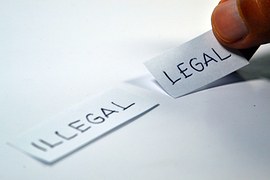Can The Police Search Me, My Car, And The Glove Box, And The Trunk After Pulling Me Over?
The Fourth Amendment to the United States Constitution guarantees each of us the right to be secure in our person and our effects. We enjoy a constitutional privilege against oppressive and unreasonable searches conducted by government agents, such as any law enforcement officers: marshals, state police, or local and municipal police. The Fourth Amendment creates a zone of privacy and protection for all of us.
Where citizens have a reasonable expectation of privacy and security, the government cannot interfere with that solitude without substantial justification.
The courts that have interpreted the Fourth Amendment throughout the years have stated repeatedly that a search conducted without the protections of a warrant is presumptively unreasonable and therefore illegal unless an exception to the warrant requirement applies. Perhaps the premier and foremost area protected by the Constitution is one’s home, but other areas are protected.

Roadside encounters between law enforcement officers and citizens present many potential opportunities for the intrepid and enterprising police officer to ferret out, uncover and prevent a criminal offense from occurring, or see that an offender is prosecuted. It also presents an opportunity for exploitation or overreaching by an overzealous police officer. As Attorney Eric T. Kirk discussed in another article, a law enforcement officer is required to possess a reasonable suspicion of criminal activity before he or she hits the lights and commands a vehicle driver to pull over to the side of the road. Of course, if the officer witnesses a violation of the motor vehicle laws, this always provides a sufficient basis to stop the car
It is at this point however that many roadside encounters transmogrify from a ticketing event into a criminal investigation and potential arrest. There is no constitutional protection for what one exposes willingly to the public such as the exterior of a car, tags, registration, and things of that nature. The Constitution, however, does protect those things in which an individual possesses a reasonable expectation of privacy.
The interior of the car and closed containers therein are protected by the Constitution. Police cannot search them without a warrant or must demonstrate that an exception applies.

In these roadside encounters, police sometimes find narcotics, drugs, weapons, firearms, or other contraband. An issue is the subsequent prosecution is whether the search that led to the discovery of the contraband was a lawful one. As noted above, warrantless searches are presumptively illegal unless an exception to the warrant requirement applies. There are numerous exceptions to the need for the police to obtain a warrant before conducting a search of a vehicle.
- The automobile exception to the warrant requirement
- Plain view
- Safety of the officer
- Consent
- community caretaking function
- exigent circumstances
- Impoundment or the arrest of the driver
Thousands of individuals are charged every year in Maryland with criminal offenses that are prosecuted using evidence uncovered during a search of a vehicle’s contents, when that vehicle was initially stopped for otherwise relatively benign traffic infraction completely unrelated to the ultimate criminal charges. The legality of the stop and the suppression of any evidence obtained as the result of an illegal search may, and frequently does, result in an acquittal. In the appropriate circumstances, a skilled defense attorney may be able to keep the state from using such evidence in court.



